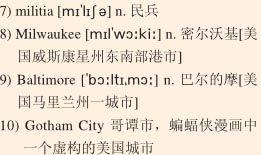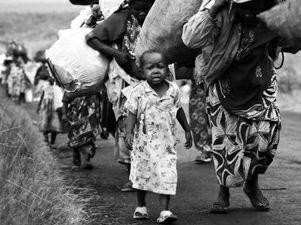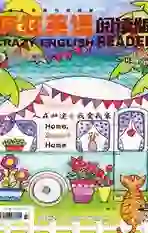刚果战火下的“超级英雄”妈妈
2014-01-08byBelindaBauman
by Belinda Bauman



This was the year my two sons began to love superheroes. We popped in the SpiderMan DVD one night out of boredom and for the next five months we watched everything SpiderMan, Superman, Ironman, and Whoeverman we could. So, when I announced I would be making a special trip to the Eastern 1)Democratic Republic of Congo (DRC) to find and record the stories of brave women living in what the U.N. calls the “most dangerous place to be a mother” their reaction was natural: “Mom, they are like superheroes.”
My journey into the heart of war-torn Eastern Congo began last summer. I first learned about the seriousness of the war in Congo years ago while living as a mom, with my two toddlers and my husband in Rwanda for 2)World Relief. The decades-long war in Eastern Congo is shaped by regional politics, ethnic rancor, and a greed surrounding the 3)lucrative mineral mines.
I saw that almost six million people have died in this war, making it the most deadly conflict since WWII, and yet never making front-page news. To mothers, the casualties are husbands, sons, daughters, and parents.
Villages where they had hoped their children would grow up are swallowed up by violence. Crops they had grown with the faith that there would be plenty are stolen. The land many of these 4)subsistence farmers hoped to pass on to their grandchildrens children is 5)pillaged and burned. As a result of this unrest and extreme vulnerability of 6)civilians, moms here live in the shadow of the largest U.N. peacekeeping mission in the world.
As I entered my first Congolese Internally Displaced peoples (IDP) camp in August of this year, I was struck by the sheer amount of children. Children of all ages—everywhere I looked.
By all accounts, on all fronts, both the formal and informal IDP camps around the region are beyond capacity. Marcel Serebungo, Church Mobilization Director for World Relief Congo, describes the situation:
“IDP camps were moving every day. People suffered so much because movement wasinvolving parents who are not strong enough to carry children and some of their belongings after spending days without eating and children who are so weak. Women and children are targeted because of their vulnerability. They live like slaves in their own villages—being beaten, put in prison without any reason, carrying burdens for armed people and paying non-reasonable taxes.”
Such was the story of Maisha Esperance. She and her family fled from the Rutshuru area one year ago. Shots fired in their village throughout the whole night, forcing her and her family out into the dark to run for their lives. The journey on foot and by cover of darkness took three days. They moved undetected from village to village and rested with the youngest children, but had to gather water and food for at least one meal.
Here in the overcrowded IDP camp, Maisha Esperance and I talked about how she gathers wood in the forest. For her, and many others who gather sticks for fire, this is dangerous work. Brave women go into the forests to gather wood. It may take as much as a third of a bundle of wood just to cook the hard casings of Congolese red beans. 7)Militia men know about these needed trips into the woods, and they wait for the women to come. Rape, as the saying here goes,is cheaper than bullets. In this region of Africa, a wife and mother are considered the beauty of the community—the heart of the home. If you can break the heart, you can break the community.
I asked if I could pray for her and her children. “Yes,” she said as she looked me in the eye for the first time. Then, without apology or hesitation she said, “Pray that I would have strength in my struggles. I need strength for my family and for the others. I feel alone. I have no one to speak for me.” This was her only request, and it came from the heart.
It turns out that mothers in war zones are not so different from mothers in Washington D.C., Los Angeles, Detroit, 8)Milwaukee, or 9)Baltimore. Women and children have suffered the unspeakable here, and yet, they are full of bravery that propels them forward every day, taking back the dignity and control that has been wrestled from them. They find food, they give birth, they wash clothes, they heal from wounds, they start businesses, and they educate their children as best they can. Moreover, they extend comfort and strength to those around them.
Just like the fictional citizens of 10)Gotham City, the grassroots moms of Congo want to live in peace. It is these mothers who live in exile and uncertainty every day that carry on their shoulders the very future of Congo. Facing these brave ones, I see their hope and my heart remembers the power of a mother motivated. A woman filled with courage to survive is nigh on unstoppable.
Much like a superhero.

那一年,我两个儿子开始崇拜超级英雄。我们在某天晚上出于无聊而看了《蜘蛛侠》的DVD,接下来的五个月,我们看遍了所有能找到的关于蜘蛛侠、超人、钢铁侠等各路英雄的片子。所以,当我宣布说我将展开一趟特别的旅程,到刚果民主共和国东部去寻找和记录在那里勇敢生活的女性及其故事时,他们的反应很自然:“妈妈,她们就像是超级英雄。”要知道,联合国称那个地方是“对母亲而言最危险的地方”。
我的这趟旅程要进入深受战争摧残的刚果东部心脏地区,其始于去年夏天。多年前,我作为一位母亲,带着两个蹒跚学步的孩子和丈夫一起在卢旺达为世援社工作。那时,我初次了解到了战争在刚果的严重性。这场在刚果东部历时数十年的战争由区域政治角力、种族仇恨以及涉及采矿场暴利的贪念而引发。我看到在这场战争中约有六百万人丧生,成为了自二战以来死伤最为严重的冲突,而这却从未成为媒体的头条。对于母亲们来说,这些伤亡人员就是丈夫、儿子、女儿和父母。

母亲们希望自己的儿女能够赖以成长的村庄惨遭暴力吞噬。她们用心栽种期望丰收的粮食惨遭窃取。这些自给自足的农民大多希望把土地传给子孙后代,而这些土地却惨遭掠夺和焚毁。局势动荡不安,百姓命途乖蹇,母亲们只能生活在联合国最大规模的维和任务庇护之中。
当我在今年八月进入首个刚果国内转移人员营地(IDP)时,单单是里面孩童的数目就把我吓了一跳。所有年龄层的孩子都有——在我视线所及的每一处。
据众人所述,在所有的前线地区,这个地域周围的正式与非正式的IDP营地都超出负荷。刚果世援社教会动员组主管马塞尔·塞雷邦戈描述了这种情况:
“IDP营地每天都在迁移。人们苦不堪言,因为转移的人中包括了没有足够气力背负孩子以及部分随身物品的父母,这些人多日来都没吃过东西,他们的孩子也很虚弱。妇女和儿童不堪一击,往往被恶势力盯上。他们在自己的村子里活得像奴隶一样,无缘无故就被殴打,投进监狱,为武装分子扛装备,缴纳各种苛捐杂税。”
那就是梅莎·埃斯佩兰斯的故事。一年前,她与家人从鲁丘鲁地区逃了出来。枪声整晚都弥漫在他们的村子里,迫使她和家人在暗夜中匆忙逃命。在黑夜的掩护下,这场徒步逃亡历时三天。他们从一个村庄逃到另一个村庄,没有被人发现;他们安顿好最年幼的孩子,但又不得不为最起码的一餐搜集水和食物。
就在这个过度拥挤的IDP营地里,梅莎·埃斯佩兰斯向我讲述了她如何到树林里收集柴火的事。对于她,以及其他许多收集树枝的人来说,这是件危险的活儿。勇敢的妇女走进树林里收集柴火。要将外壳坚硬的刚果红豆煮熟可能需要多达三分之一捆的木柴。民兵男子知道这些进入树林的必要之旅,他们就等着妇女们的到来。强暴,正如这里的说法所述,要比子弹廉价。在非洲的这个地区,妻子和母亲被视作社区之美——家的心脏。要是你能毁掉这个心脏,你就能毁掉整个社区。
我问梅莎我能否为她和她的孩子祈祷。“当然可以,”她说道,她的眼睛第一次直视我。然后,没有辩解和犹豫,她说道:“替我祈祷,希望我在挣扎中拥有力量。我需要用以支持我的家人和其他人的力量。我感觉孤单。我没有能为我说话的人。”这就是她唯一的请求,而这发自真心。
很明显,战争地区的母亲与来自华盛顿特区、洛杉矶、底特律、密尔沃基或者巴尔的摩的母亲其实并无二致。妇女和儿童在这里遭受了难以言喻的痛苦,然而,他们却满载勇气,驱使他们每天前进,将被人剥夺的尊严和支配权夺回来。她们寻找食物、她们生儿育女、她们洗衣服,她们从伤痛中治愈,她们创业营生,她们尽己所能让孩子接受教育。除此之外,她们将安慰和力量传达给身边的人。
就像哥谭市的虚构市民一样,刚果的草根母亲渴望生活在和平之中。正是这些每天活在流离失所和动荡当中的母亲肩负着刚果的未来。面对着这些勇敢的人,我看到了她们的希望,而我的心中则记下了一位积极母亲的力量。一位满怀生存勇气的女子是几近无可阻挡的。
像极了一个超级英雄。
